| Srl | Item |
| 1 |
ID:
111575
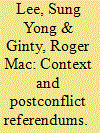

|
|
|
|
|
| Publication |
2012.
|
| Summary/Abstract |
This article argues that referendums in societies coming out of war often fit into the conflict resolution rather than the conflict transformation paradigm. As conflict resolution devices, they may be one-off events rather than part of a longer term attempt to recalibrate relationships between antagonistic groups. Using a number of case studies, the article argues that unless the ground is prepared beforehand, referendums may have a limited ability to bring about reconciliation. Some well-timed referendums have advanced peace processes at critical moments, but these are exceptions and we should be cautious in recommending them as exemplars to other cases. The article highlights three common contextual issues that limit the conflict amelioration possibility of referendums: the exclusion of key constituencies from debates on the referendum process, a lack of voter education, and generalized insecurity.
|
|
|
|
|
|
|
|
|
|
|
|
|
|
|
|
| 2 |
ID:
133940
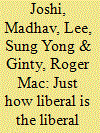

|
|
|
|
|
| Publication |
2014.
|
| Summary/Abstract |
This article assesses the extent to which the liberal peace (the dominant form of internationally supported peacemaking) actually deserves the sobriquet 'liberal peace'. In recent years, an intense debate emerged on this question as critics of the critique of the liberal peace have sought to downplay the dominance of the liberal peace. These debates are interesting but they are mainly based on qualitative analysis supplemented with some case study material, and often rely on assertions rather than evidence. This article seeks to add to this debate with simple aggregate data from the Peace Accords Matrix that is comprehensive and comparative. The article constructs a five-part framework to analyse the liberal elements of peace accords liberalism and then tracks the extent to which the elements of the framework are found in peace accords. Through this examination, it is found that the liberal peace is indeed the dominant form of peace-support intervention, although there are considerable variations in the extent and implementation of the liberalism in peacebuilding.
|
|
|
|
|
|
|
|
|
|
|
|
|
|
|
|
| 3 |
ID:
140963
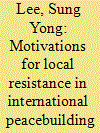

|
|
|
|
|
| Summary/Abstract |
This article discusses the complex motivations underlying local resistance to externally led post-war peacebuilding programmes. In examining the land distribution process in post-war Cambodia it proposes a five-part typology of motivations for the resistance that frequently appears in the context of international post-conflict peacebuilding processes. The article also argues that a single campaign of resistance is likely to involve multiple actors with multiple motivations.
|
|
|
|
|
|
|
|
|
|
|
|
|
|
|
|
| 4 |
ID:
099852
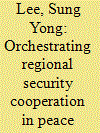

|
|
|
|
|
| Publication |
2010.
|
| Summary/Abstract |
By contrasting the peace negotiation processes in Cambodia and El Salvador, this paper argues that although the structural constraints against regional security cooperation in Southeast Asia and Central America during the 1980s were similar, the states in the two regions achieved varying success in overcoming two major structural constraints: the influence of global/regional actors and internal disunity. In particular, it focuses on how the political will and diplomatic skills of Indonesia and Mexico led to their different levels of contribution to the peace processes and their respective achievements. Through this, this paper intends to re-examine a core assumption of neorealism, that is, that structural constraints have a determinant influence on actors' behaviour.
|
|
|
|
|
|
|
|
|
|
|
|
|
|
|
|
| 5 |
ID:
119720
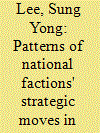

|
|
|
|
|
| Publication |
2013.
|
| Summary/Abstract |
By proposing a perception-oriented typology and applying it to the Cambodian peace negotiations, this study attempts to provide an analytic framework for examining the changes in national factions' negotiation strategies during civil war peace negotiation processes. Specifically, this article stresses that domestic negotiating actors readjust their strategies 'phase by phase' according to their subjective consideration of three factors: the contents of the peace proposal, the resources under their control, and the strength of the incentives and pressures from external interveners. Based on this finding, this study further (1) demonstrates that a peace negotiation is a continuous process in which multiple chances for successful conflict resolution also continuously change and (2) highlights the importance of perceptual factors in explaining the behaviour of national factions in peace negotiations.
|
|
|
|
|
|
|
|
|
|
|
|
|
|
|
|
| 6 |
ID:
149065
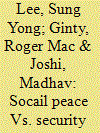

|
|
|